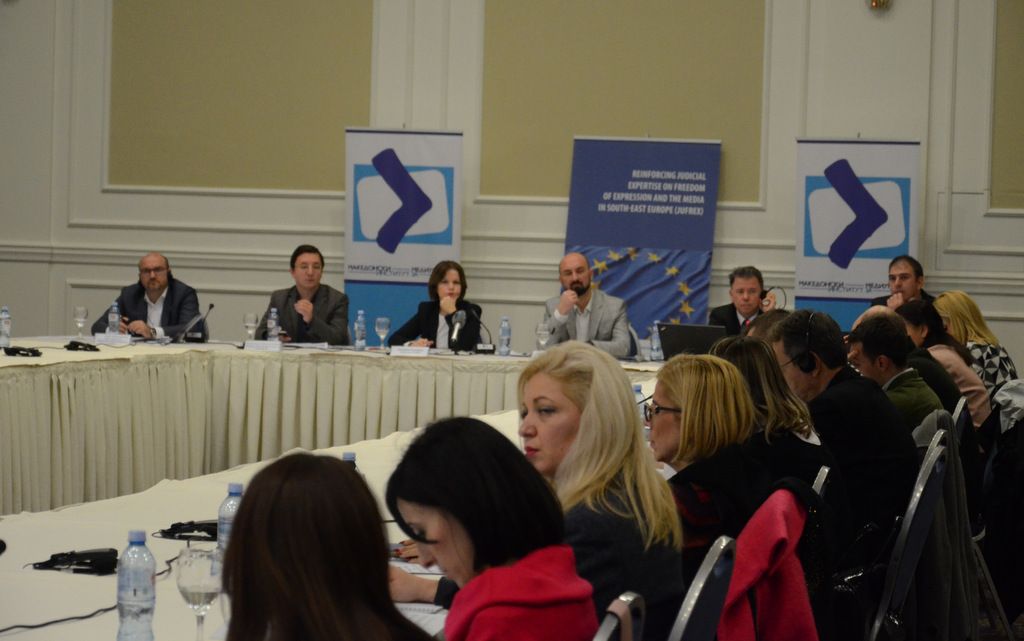It is necessary to find effective mechanisms to intensify cooperation between the media and the judicial authorities in order to improve their communication and establish their mutual trust. The foregoing was the joint conclusion arrived at by representatives of the press, judges and prosecutors at the conference 'Media reporting on court proceedings' organized by the Macedonian Institute for the Media in cooperation with the Council of Europe.
The aim of the conference was to enable the exchange of experience and positions among representatives of the judicial authorities and the press with regards to media reporting about court proceedings and consider opportunities for the improvement of their communication and cooperation for the purpose of informing the public on time and with due quality concerning issues from the sphere of the public interest.
Mr. Frédéric Grass, an international expert and a lawyer from Paris, addressed in his presentation the standards contained in the Recommendation of the Council of Europe referring to the supply of information through the media about criminal procedures, as well as the Declaration on Media Reporting with regards to criminal procedures. He stressed the right of the press to criticize the judiciary, but also emphasized that representatives of the state authorities are expected to have higher tolerance to criticism. During his address, Mr. Grasse said that when reporting from criminal proceedings, journalists should 'use a suitable vocabulary'; comply with the relevant ethical standards by presenting facts from sources, thereby respecting the rule on the presumption of innocence, the right to privacy and the respect for the dignity and security of all stakeholders in the court proceedings.
According to Aleksandar Dimitrievski, a journalist who specializes in the judicial matters under the 360 Degrees programme on Alsat TV, there still exists some mistrust among journalists, judges and prosecutors; justice authorities lack higher levels of transparency, they are rarely transparent when it comes to comments to their decisions and actions in the media, and he emphasized that there are journalists who do not know sufficiently the procedures and the laws. He proposed several recommendations that would make the work of the journalists easier, would improve communication between the courts and the journalists, and the overall transparency of the courts: 'Professionalization of spokespersons and their promotion into people who will be more than mediators between the journalists and judges; establishment of a functional mechanism for sanctioning judges who refuse to cooperate with the public; the holding of regular press conferences and briefing sessions by the court presidents and the heads of the prosecution offices, publicly available indictments from cases of public interest, as well as regulating the issue of recording in the court room."
Judge Nenad Saveski from the Basic Court Skopje 1 agreed that it is necessary to improve communication with the journalists, whereas greater mutual trust would be established. According to judge Saveski, the courts will be able to demonstrate greater independence through their cooperation with the media. Judge Saveski claims that criticism from journalists to the 'silence', i.e. alleged non-transparency of the courts with regards to actions within specific cases in the realm of public interest stems from 'prudent behaviour' on the part of judges, as well as from a series of legal limitations such as the presumption of innocence, protection of privacy, safekeeping of the security and dignity of the participants in the process, preserving the reputation of the court, etc. He went on to explain that the courts perform their PR function through press releases and spokespersons and he agreed that both professions should have more frequent meetings for purposes of improving their cooperation.
The public prosecutor Jovan Cvetanovski, from the Higher Prosecutor's Office in Skopje, also agreed that the public should be informed through the media and all reporters requesting information should obtain it. He proposed that regular briefing sessions should be held with the journalists in order to improve communication of the prosecution office with the public and increase trust in the institutions.
The conference was held within the project ‘Reinforcing Judicial Expertise on Freedom of Expression and the Media in South-East Europe (JUFREX)' co-funded by the European Union.
Find enclosed the presentation of the international expert Mr. Frédéric Grass, as well as the recommendation and declaration of the Council of Europe on the subject of reporting on criminal procedures.
![]() Transparency of judicial authority media coverage of court proceedings641.22 KB
Transparency of judicial authority media coverage of court proceedings641.22 KB





